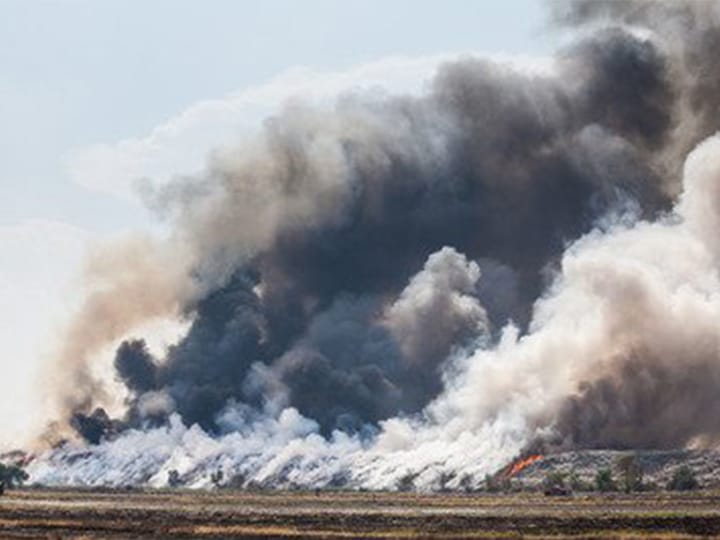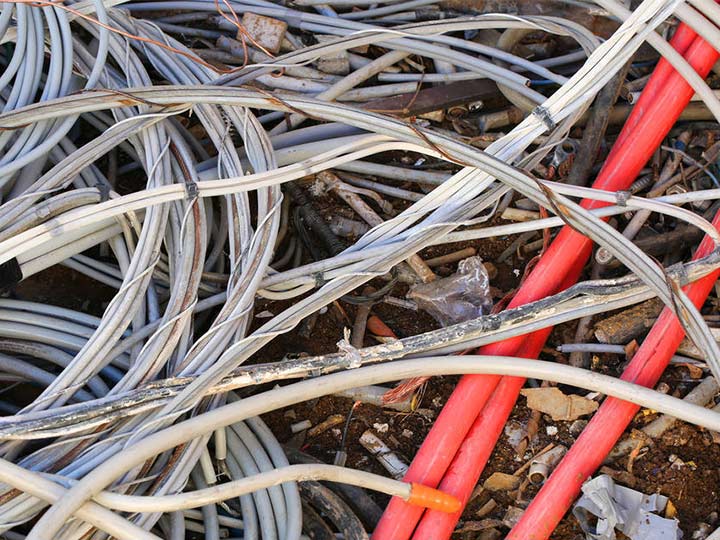लोगों के जीवन स्तर में सुधार के साथ, घरेलू उपकरण, वाहन (कार, मोटरसाइकिल, इलेक्ट्रिक वाहन, आदि) भी तेजी से लोकप्रिय हो रहे हैं, और तारों और केबलों का उपयोग बढ़ रहा है। इन चीज़ों के प्रतिस्थापन के साथ-साथ अपशिष्ट निपटान की मात्रा भी बढ़ रही है। हमें बेकार तारों और केबलों के पुनर्चक्रण और पुन: उपयोग के साथ क्या करना चाहिए? बेकार तारों और केबलों को खजाने में बदलने के क्या तरीके हैं?
अपशिष्ट तार और केबल को पुनर्चक्रित करके, हम मुख्य रूप से इसमें अलौह धातु तांबा प्राप्त करना चाहते हैं। इसलिए जिन बेकार तारों और केबलों का हम पुनर्चक्रण करते हैं, हमें पूछना होगा कि उनसे कैसे निपटा जाए। इससे कोई फर्क नहीं पड़ता कि किस विधि का उपयोग किया जाता है, अंतिम लक्ष्य तांबे को तार से अलग करना है। इस परिणाम के साथ चलते हुए, हमारे पास अपशिष्ट तार और केबल उपचार के तरीके हैं जैसे कि जलाना, छीलना, कुचलना, जमाना इत्यादि। निम्नलिखित में, हम अपशिष्ट तारों और केबलों की रीसाइक्लिंग प्रसंस्करण विधियों को निम्नानुसार संक्षेप में प्रस्तुत करते हैं।
हाथ से छीलना
यह विधि तार और केबल की त्वचा को छीलने के लिए मैन्युअल विधि का उपयोग करती है, जिसमें उच्च दक्षता और कम लागत होती है। कुछ केबलों और चौकोर तारों को संभालना बेहतर है। यदि यह कुछ ऑटोमोटिव तार, नेटवर्क केबल, घरेलू उपकरण अलग करने वाले तार और अन्य छोटे व्यास वाले तार हैं, तो इसका प्रभाव खराब होता है। वर्तमान आर्थिक विकास के साथ, श्रम लागत अधिक से अधिक होती जा रही है, और कम और कम लोग बेकार तारों और केबलों के उपचार के लिए इस पद्धति का उपयोग करते हैं।
भस्मीकरण
यह विधि एक अधिक पारंपरिक विधि है, जो अपशिष्ट तारों और केबलों को सीधे जलाने के लिए वायर शीथ की दहनशील प्रकृति का उपयोग करती है और फिर अंदर के तांबे को पुनर्चक्रित करती है। आग से तांबा बाहर निकल गया। तार को जलाने की प्रक्रिया के दौरान, तांबे के तार में गंभीर ऑक्सीकरण हुआ, जिससे अलौह धातुओं की रीसाइक्लिंग दर कम हो गई। इसके अलावा, जलते तार से पर्यावरण को भारी प्रदूषण होता है। आज जब देश पर्यावरण की रक्षा के लिए प्रयासरत है तो इस पर स्पष्ट रूप से रोक है।

यांत्रिक छीलने की विधि
यह विधि एक तार स्ट्रिपिंग मशीन का उपयोग करती है, जो एक अर्ध-यांत्रिक ऑपरेशन है, इसके लिए एक मानव की आवश्यकता होती है, और इसमें उच्च श्रम तीव्रता होती है। इससे भी महत्वपूर्ण बात यह है कि यह विधि केवल कुछ एकल-स्ट्रैंड वर्गाकार और बड़े व्यास वाले केबल तारों के लिए उपयुक्त है। यदि हम ऑटोमोबाइल तार, घरेलू तार, नेटवर्क केबल, इलेक्ट्रॉनिक तार जैसे कच्चे माल का पुनर्चक्रण करते हैं, तो वायर स्ट्रिपिंग उपकरण का उपयोग करना उपयुक्त नहीं है।
यांत्रिक कुचलने की विधि.
इस विधि में, तांबे और प्लास्टिक के विभाजक का उपयोग विभाजन के लिए किया जाता है, और क्रशिंग और छांटने का उपयोग किया जाता है। सबसे पहले, कचरे के तारों और केबलों को पीसकर छील दिया जाता है, और फिर तांबे और प्लास्टिक को पानी धोने, वायु विभाजन और विद्युत स्थैतिक विभाजन के माध्यम से अलग किया जाता है। यह विधि विभिन्न प्रकार के सामग्रियों पर लागू होती है, जैसे कि न केवल मोटे चौकोर तार और केबल के तार, बल्कि ऑटोमोबाइल तार, मोटरसाइकिल के तार, इलेक्ट्रिक कार के तार, नेटवर्क के तार, संचार के तार, घरेलू उपकरणों के नष्ट करने वाले तार, और इलेक्ट्रॉनिक तार भी। साथ ही, यांत्रिक छीलने वाले उपकरणों की तुलना में, इसकी उत्पादन क्षमता अधिक है, जो मैनुअल कार्य की तीव्रता को काफी कम करता है। सूखे प्रकार के केबल पुनर्चक्रण उपकरण की गैर-धोने की विशेषताओं के कारण, आज के सख्त पर्यावरण संरक्षण के कारण, इसकी बाजार मांग अपेक्षाकृत अधिक है।
रासायनिक विधि
जब हम "रसायन विज्ञान" शब्द के बारे में बात करते हैं, तो हम सबसे अधिक पर्यावरणीय मुद्दों के बारे में सोचते हैं। दरअसल, इस विधि में रासायनिक औषधि का उपयोग किया जाता है, जिसे औषधि को भिगोकर तांबे से अलग किया जाता है। समस्या यह है कि उत्पादित औषधीय घोल को संभालना आसान नहीं है और इससे बड़े पैमाने पर पर्यावरण प्रदूषण होगा। इसलिए, यह विधि अभी प्रायोगिक चरण में है और इसे नागरिक उपयोग में नहीं लाया गया है।

फ्रीजिंग विधि।
यह विधि भी 1990 के दशक में प्रस्तावित की गई थी। यह रेफ्रिजरेंट के रूप में तरल नाइट्रोजन का उपयोग करता है, जिससे अपशिष्ट तार और केबल अति-निम्न तापमान पर जम जाते हैं और भंगुर हो जाते हैं, और फिर प्लास्टिक और तांबे को अलग करने के लिए टूट जाते हैं और हिल जाते हैं। इस विधि की लागत अधिक है, इसे बड़े पैमाने पर संचालित करना कठिन है, और इसे वास्तविक उत्पादन में नहीं लगाया गया है।
उपरोक्त में, हमने अपशिष्ट तारों और केबलों के पुनर्चक्रण के लिए विभिन्न तरीके पेश किए हैं। हालाँकि, अधिक सामान्य विधि यांत्रिक क्रशिंग है। फिलहाल बाजार में केबल रीसाइक्लिंग मशीनों के कई निर्माता हैं, इसलिए इन्हें खरीदते समय आपको सावधान रहने की जरूरत है।

